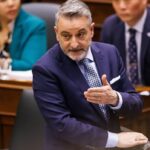New BrunswickA New Brunswick urban economist says Mark Carney’s first federal budget is ambitious but underwhelming, as unions warn of job cuts and Conservatives criticize rising deficits and broken promises.Some New Brunswickers react to different parts of the federal budgetJennifer Sweet · CBC News · Posted: Nov 05, 2025 11:53 AM EST | Last Updated: 2 hours agoListen to this articleEstimated 5 minutesYves Bourgeois, dean of social sciences at Mount Allison University, says the spending plan tabled Tuesday could be transformational, but this would depend on many variables. (Submitted by Mount Allison University)A New Brunswick economist says the first federal budget from the government of Mark Carney is ambitious but also underwhelming.Carney had promised to present a pro-growth budget that would usher Canadians into a “new era” and define the next century.Yves Bourgeois, an urban economist and dean of social sciences at Mount Allison University, says the spending plan tabled Tuesday could be transformational, but this would depend on many variables.“I think it’s trying to lay out groundwork for us to change course away from … dependence on trade to the U.S. and start rebuilding our capacity to innovate and seize these opportunities,” Bourgeois said on Information Morning. “But there’s a lot that needs to play out in between what’s in the budget and this new course of action.”Bourgeois said he didn’t see much in the budget about much-touted nation-building projects.He noted the exceptions of more money for research and development, defence and aerospace, and developing infrastructure to get natural resources to market.That additional funding for infrastructure, as well as for housing, could be of particular interest to New Brunswick, he said.New Brunswick also has tech and manufacturing businesses that could stand to benefit from increased spending on aerospace and defence, added Bourgeois, but that’s “a bit of a longer shot,” he said.Meanwhile, dialling back the number of temporary residents will be bad for the province, said Bourgeois, especially for seasonal industries and construction.He likes the goal of getting a sustainable level of immigration, which would bring more predictability, but doesn’t like that universities will continue to see fewer international students. Union sees trouble in cuts to workforceFederal civil servants are not pleased about a budget proposal to reduce the workforce by 10 per cent between next April and 2029.That’s part of a plan to generate $60 billion in savings and revenue over five years.“The extent of the cuts is significant,” said Chris Di Liberatore, regional executive vice-president with the Public Service Alliance Atlantic.“The number that we’ve seen — 40,000 public service jobs — that doesn’t factor in the 10,000 jobs that were already lost over the past year.”Di Liberatore’s union represents about 6,500 federal workers in New Brunswick. There are more represented by other unions. It’s not clear where the cuts will be, but all departments were asked to find 15 per cent in savings. Chris Di Liberatore, regional executive vice-president with the Public Service Alliance Atlantic, predicts the cuts will mean longer waits for things like employment insurance and passports, and fewer people to answer questions about things like taxes. (PSAC Atlantic)Di Liberatore predicts longer waits for things like employment insurance and passports and fewer people to answer questions about things like taxes.The federal government said jobs will be eliminated through early retirement and attrition.That will increase the workload, strain and burnout for remaining employees, Di Liberatore said.The public service has grown from about 250,000 in 2015 to more than 350,000 today, Di Liberatore saidi reflects the growing and aging population.“They don’t want to talk to a chat bot,” he said. “They want to reach somebody on the end of the line with compassion who can answer the questions that they have during what may be a very difficult time in their life.”Conservative sees broken promisesConservative MP John Williamson of Saint John–St. Croix said he won’t be supporting the budget.“It fails on the affordability test. It is a massive bonfire of deficits as far as the eye can see and it’s a litany of broken promises.”The proposal projects a deficit of roughly $78 billion for the 2025-26 fiscal year.Six months ago, Prime Minister Carney promised to keep the deficit to no more than $62 billion, said Williamson.He also promised to lower the debt to GDP ratio, said the Conservative MP, but instead it’s increasing.Williamson would prefer to see more done to get rid of government waste, overlap and duplication.Conservative MP John Williamson of Saint John–St. Croix said he won’t be supporting the budget. (Graham Thompson/CBC)“In the case of housing, we have multiple federal programs as opposed to actually home building.”Federal Finance Minister Francois-Philippe Champagne said a balanced budget would have required the elimination of vital social programs and would not allow capital investments to eventually make Canada less reliant on the U.S. The biggest missing piece in the budget, in Williamson’s view, are tax cuts on things like fuel, industrial carbon, food, steel and concrete, which he believes would help reduce the cost of living.One aspect of the budget he supports is the creation of tax incentives to businesses to build new facilities.If Conservative amendments to the budget are passed, Williamson said he might change his mind about his vote.Williamson said he doesn’t think Canadians want a Christmas election, but his party is ready for one. It’s up to Carney to find the votes to get his budget passed, he said.ABOUT THE AUTHORJennifer Sweet has been telling the stories of New Brunswickers for over 20 years. She is originally from Bathurst, got her journalism degree from Carleton University and is based in Fredericton. She can be reached at 451-4176 or jennifer.sweet@cbc.ca.With files from Information Morning Fredericton
Carneys first budget ambitious but underwhelming, N.B. economist says











